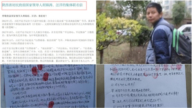【新唐人2014年05月13日讯】法国媒体报导说,中国城市陷入恐惧,在中国,除了北京、上海、广州、深圳四大都市之外,其他城市的房地产价格不断下跌。今年以来,中国陆续出现房企老板因资金链断裂,欠下巨额债款后跑路的事件。大陆评论人士指出,中国的房地产泡沫破裂迫在眉睫,而中共政权也将随之崩溃。
法国《世界报》报导说,在江苏常州市新北区靠近最新修建的高铁火车站地区,新区的房产售价近期不断下跌,引发业主的强烈抗议,他们连续几个周末在新区示威抗议,要求收回他们的血汗钱。一位姓薛的房地产分析师向《世界报》表示,常州地方规划部门在市区的四角修建了四个可容纳三十万人的新区,这使常州未来好几年的住房需求都已得到满足。
大陆媒体《腾讯财经》5月10号报导,山东青岛市“君利豪集团有限公司”董事长王莉自4月30号起失去联系,经证实,这是又一起房产商因资金链断裂,欠下巨额欠款跑路的案例。报导说,王莉欠下高达12亿以上巨额债务,涉及三家以上的国有大型商业银行,以及多个民间借贷公司和个体。
今年以来,随着大陆房地产业销售量严重萎缩,库存高积,房地产商资金链频频出现问题,房地产业危机影响了上游,业内人士分析,土地市场的拐点已经全面到来。
报导说,5月5号,沈阳共有五幅土地拍卖,最终四个地块流拍,而唯一成功拍卖的地块也是以接近底价成交,总价仅仅93万元。
沈阳市国土局公布的信息显示,这五幅土地有三幅为商务用地,两幅为商住混合用地,合计拍卖土地面积近10万平方米。而拍卖起始价最高每平方米仅1,584元,参与现场竞拍的只有三家企业。
湖南长沙市工程师蔡立新认同,中国房地产具有严重的泡沫。
湖南长沙市工程师蔡立新:“国内的一些鬼城,房屋积压在那里,大量的鬼城出现,比如鄂尔多斯、珠海、惠州,那就是说,房子严重过剩。泡沫早晚有一天要破裂的。估计不会太远了。”
江西南昌市商人李少明认为,中共当局不会让楼市崩溃。他估计从现在往后几年,其他的物价会涨,但房价不涨,然后造成贬值。
江西南昌市商人李少明:“中国在世界上来讲是一种比较特殊的体制,整个中央政权是可以掌控一切资源的。它可以调用的所有资源,它能够使用的方法,选择余地是很大的。”
广东广州市建筑工程管理高级工程师徐琳认为,中国房地产泡沫很快将破裂,他个人预计就在下半年。他表示,房市泡沫破裂必然导致政权的崩溃。
广东广州市建筑工程管理高级工程师徐琳:“因为中国的房地产跟中国政府是密切相关的。土地的买卖从中获利,带有一定的股份。再一个就是很多房地产项目商通过银行贷款这种方式来运作的。再一个,中国政府对于市场的监管有很多的关卡,通过各种手段去设置关卡,从中牟利。也就是这个政权跟房地产行业千丝万缕的关系。房地产一旦泡沫破裂的话,这个政权也就会相应的受到牵连。”
蔡立新指出,由于中国房地产跟政府、银行之间捆绑的关系很大,一旦房地产泡沫破裂,银行坏账、呆账大面积出现。当局为了所谓的维稳,估计会拚命大量印发钞票,人民币会迅速贬值,老百姓口袋里的钱就被稀释了,严重影响老百姓的日常生活。
徐琳也认为,在短期内,老百姓会受一些损失,比如物价上涨,物资短缺,甚至一定程度上的社会动乱。但这是社会变革时期必经的一个阵痛。
徐琳还指出,最近政治事件频发,显示出风雨欲来的景象。包括前政治局常委周永康传言被抓,贪官接二连三落马。此外,最近瑞士银行不再对外籍客户保密,也使得贪官的海外资产会逐渐的曝光,徐琳认为,这对中共官员来说是很不利的因素,将导致中共政权越来越摇摇欲坠。还有群体事件层出不穷,比如杭州市余杭区民众因反对垃圾焚烧项目而举行示威,东莞鞋厂三万人举行罢工抗议薪资不足等。
采访编辑/秦雪 后制/陈建铭
Le Monde: China’s Housing Market In Panic
French media have recently reported
that “Chinese cities are in panic".
House prices continue to fall in most Chinese cities, aside
from than Beijing, Shanghai, Guangzhou and Shenzhen.
Since this year, there have been several
chairmen of real estate companies that
have gone missing after owing huge debts.
Commentators suggest that China’s
housing bubble will soon burst.
This shift in the economy may also set into motion
the collapse of the Chinese Communist Party (CCP).
Le Monde has reported on housing prices in a recently
developed area close to a high-speed railway station
in Xinbei District of Changzhou city, Jiangsu Province.
The house prices have been continuously dropping.
House owners in the area have responded
with protests for several consecutive weeks,
demanding compensation for their losses.
Mr. Xue, a real estate analyst, told Le Monde that
the Changzhou government had built four residency
areas capable of accommodating 300,000 people.
These new areas are enough to meet the
city’s need for new houses for many years.
On May 10, Tencent’s finance channel reported
that Wang Li, Chairman of Qingdao’s Jun Li Hao
Group Limited, has been missing since April 30.
This was confirmed as another case where real
estate entrepreneurs have escaped after owing
huge debts, due to broken funding chains.
Tencent said Wang owes a huge debt
of over 1.2 billion Yuan ($192 million).
This involves more than three major state-owned commercial
banks, and a number of private loan companies and lenders.
In 2014, China’s house sales have become very poor.
This has lead to funding chain problems for many developers,
and further impacts funding resources for those developers.
Insiders suggest China’s land market
is witnessing an important turning point.
On May 5, Shenyang auctioned off five pieces of land.
However, four of them failed to find buyers, and the only
successful deal was done at almost the starting price.
According to Shenyang’s municipal Land Resources
Bureau, among the five auctioned pieces of land,
three are for business use and two for hybrid use.
The total area is close to 100,000 square meters.
The highest starting price was only
1,584 Yuan ($253) per square meter.
Only three companies took part in the auction.
Cai Lixin, an engineer from Changsha, agrees that
China’s housing market has a serious bubble problem.
Cai Lixin: “There are numerous empty
houses in ghost towns all over China.
In cities such as Erdos, Zhuhai and
Huizhou we see many ghost towns.
That shows how excessive the house supply
is, and the bubble will burst up sooner or later.
Personally, I think that day is not far away."
Li Shaoming, a business owner from Nanchang City,
Jiangxi Province, said the CCP will stop the housing
market from collapsing as much as they can.
Li believes that in the next few years,
prices will continue to increase in China.
However, house prices will not,
leading to depreciation of houses.
Li Shaoming: “China has a unique
regime compared to other countries.
The CCP’s central government has control over all resources.
Therefore, it can use everything to solve the problem.
It has a lot more space than other governments."
Xu Lin, an advanced construction engineer in Guangzhou,
also suggest China’s housing bubble will break soon.
He speculates that it may happen in the second half of 2014.
Xu further commented that once the housing
bubble bursts, the whole regime will collapse.
Xu Lin: “The reason (I say that) is because China’s
housing market is closely linked with the CCP.
The authorities make money from land sales, and many
developers have to take loans from state-owned banks.
In addition, the CCP regime has a lot of
ways of ‘managing’ the housing market.
It can benefit from any regulation it makes.
In one word, the whole regime has all kinds
of connections with the housing market.
Once the housing market collapses, the
CCP regime will be unavoidably involved."
Cai Lixin suggest that China’s housing market
is tied together with the CCP and its banks.
Once the housing bubble bursts, it will
result in massive bad debts for the banks.
In that case, the CCP will probably print money
as much as they can to maintain the regime.
As a result, the Chinese Yuan will depreciate quickly.
Chinese people’s daily lives will be seriously
affected, as their money slips away as such.
Xu Lin said that from a short-term viewpoint, Chinese
people will see economic loss from increasing prices.
They will see shortages of daily goods,
and increasing social tensions.
However, that is an unavoidable pain for
any society as it makes critical reforms.
Xu Lin further comments that political incidents are
occurring more frequently during recent months.
This indicates an upcoming storm in China.
Former Politburo Standing Committee
member Zhou Yongkang was arrested.
A number of corrupt officials were dismissed,
which was very bad news for all CCP officials,
as they were shaking the whole regime, Xu said.
In addition, more large-scale
protests are also seen now in China.
An example is the protests held by Yuhang residents in Hangzhou,
who were standing against a construction plan for a waste plant.
Workers strikes involved 30,000 workers at a shoe factory
in Dongguan, who were protesting against low salaries.
Interview & Edit/Qin Xue Post-Production/Chen Jianming



























